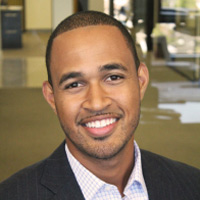For Your Money, Which is Better: The Algorithm or the Adviser?
When choosing between a human financial adviser and a robo-adviser, the best thing for most people is not either one: It's both.


Profit and prosper with the best of Kiplinger's advice on investing, taxes, retirement, personal finance and much more. Delivered daily. Enter your email in the box and click Sign Me Up.
You are now subscribed
Your newsletter sign-up was successful
Want to add more newsletters?

Delivered daily
Kiplinger Today
Profit and prosper with the best of Kiplinger's advice on investing, taxes, retirement, personal finance and much more delivered daily. Smart money moves start here.

Sent five days a week
Kiplinger A Step Ahead
Get practical help to make better financial decisions in your everyday life, from spending to savings on top deals.

Delivered daily
Kiplinger Closing Bell
Get today's biggest financial and investing headlines delivered to your inbox every day the U.S. stock market is open.

Sent twice a week
Kiplinger Adviser Intel
Financial pros across the country share best practices and fresh tactics to preserve and grow your wealth.

Delivered weekly
Kiplinger Tax Tips
Trim your federal and state tax bills with practical tax-planning and tax-cutting strategies.

Sent twice a week
Kiplinger Retirement Tips
Your twice-a-week guide to planning and enjoying a financially secure and richly rewarding retirement

Sent bimonthly.
Kiplinger Adviser Angle
Insights for advisers, wealth managers and other financial professionals.

Sent twice a week
Kiplinger Investing Weekly
Your twice-a-week roundup of promising stocks, funds, companies and industries you should consider, ones you should avoid, and why.

Sent weekly for six weeks
Kiplinger Invest for Retirement
Your step-by-step six-part series on how to invest for retirement, from devising a successful strategy to exactly which investments to choose.
We’ve seen a massive movement toward convenience and automation in nearly every industry. As consumers move toward the option of ordering products online from sites like Amazon, the retail world has seen a record-breaking number of brick-and-mortar store closures. Fortune even predicts that nearly half of retail jobs will be lost to automation, as self-checkout features and other human-less technology advances.
This movement has spread to the financial advisory industry, with the emergence of new technology affecting the way advisers give financial advice.
The reality is, the rapid growth and early-stage adoption of financial technology (FinTech) indicates an industry disruption is underway. Algorithm-based, digital advisory technology has brought us the increasingly popular “robo-advisers,” which replace human advisers with software programmed to understand and advise on clients’ needs. Robo-adviser firms have witnessed triple-digit growth since 2013. Research firm Cerulli Associates reported they had about $60 billion in assets under management (AUM) at the end of 2016, and could amass an estimated $385 billion by 2021.
From just $107.88 $24.99 for Kiplinger Personal Finance
Become a smarter, better informed investor. Subscribe from just $107.88 $24.99, plus get up to 4 Special Issues

Sign up for Kiplinger’s Free Newsletters
Profit and prosper with the best of expert advice on investing, taxes, retirement, personal finance and more - straight to your e-mail.
Profit and prosper with the best of expert advice - straight to your e-mail.
According to the Labor Department, there are over 200,000 personal financial advisers in the U.S., of which roughly 20% are certified financial planners (meaning they passed an exam administered by the Certified Financial Planner Board of Standards, completed qualifying work experience and have agreed to adhere to the CFP board’s ethics code) and a mere 1.7% are chartered financial analysts (a designation awarded by the CFA Institute after passing three difficult exams related to advanced investment analysis and portfolio management).
If you’re weighing your options for financial services, keep this in mind: The key is in assembling a well-rounded team. The team should consist of an investment adviser or a robo-adviser, a financial planner or wealth manager (depending on net worth), a CPA and an insurance agent. Be wary of calling just one person your financial adviser. That can lead to gaps in your overall financial life. However, you may identify one person as your “trusted adviser,” which means, out of all the individuals on your financial team, you lean on the opinion and advice of that person more than the others.
Many people believe they have chosen to work with a “financial adviser,” but while that term appears on many professionals’ business cards, once you look at their licenses and pay attention to what they actually do, you will find they are one of the following:
- Investment Adviser/Portfolio Manager: Engages in the business of providing advice or issuing reports or analyses regarding securities.
- Financial Planner: Develops detailed strategies around financial goals, such as retirement, college planning, debt reduction, taxes and estate planning.
- Insurance Agent: Provides general financial advice around retirement, college planning and estate, with a major focus on insurance placement and risk reduction.
- Certified Public Accountant (CPA)/Business Manager: Heavy focus on tax strategy and expense management with general financial advice around retirement and real estate.
- Wealth Manager: Provides advice and strategy around non-liquid assets (i.e., real estate, art, collectibles). Includes not only risk management, but also asset protection, advance estate planning utilizing trusts, business structures, etc.
As you decide which option is best for you, it’s important to consider all aspects that are associated with your own financial situation. This may include cost, personal connection and competence.
Cost
The recent surge in robo-adviser popularity can be partly credited to its affordability, compared with the costs and fees charged by human advisers. For example, Millennials are a famously financially troubled generation, and software designed to fit their budgets and lifestyles is making wealth management cheaper. Traditional financial advisers usually charge fees or commissions (most at about 1% of assets under management or more), but this isn’t the case for robos. These platforms typically have lower fees, around 0.15% to 0.25%. If your account balance is under a certain limit, some won’t charge any fees at all.
Robo-advisers have opened up investment options to everyone. In a sense, they are democratizing investment advice, regardless of age or income.
Connection
There is one substantial advantage human advisers have over their robot counterparts — the human touch. We all know managing money is an emotional process. You want someone you can trust and who understands your long-term goals. Younger generations are known for favoring technology and convenience, but the human touch isn’t lost on them. A recent study found that 70% of Millennials surveyed said that a human adviser would bring them a higher return on their investment than robots.
The bottom line is that many financial advisers are used to catering to older generations. It’s crucial they adapt to the investment preferences and styles of a younger generation who present unique challenges and monetary goals. The client base will continue to change, and advisers’ services should grow with them. If they don’t modify their advising styles, the robo-advisers will.
Competence
Financial planning is a comprehensive process that requires integration of all areas of your financial goals. With that, each individual has separate needs that must be catered to their situation.
Robo-advisers may be able to assist with where to allocate your money for investment opportunities, but they may not be able to adapt to your changing needs. For instance, what if you are planning to start a family or you need to refinance your debt?
Vanguard published a paper in which they found that a client’s wealth is typically increased 3% each year with a financial adviser. It further suggests that financial advisers play a role in keeping a focus on long-term goals and prevent investors from making impulsive decisions.
Solution: Co-exist
The ideal financial advisory team consists of advisers who can co-exist for the benefit and best interest of the client.
Traditional financial services offer customized advice and plans based on a clients’ needs, which competes with lower fee ranges offered with digital tools. However, we can’t reject the benefits that robo-advisers provide. A Capital One survey showed that nearly 70% of Americans want services that offer a blend of human and digital guidance: a hybrid solution. It also found that an overwhelming majority like the idea that technology offers an option to connect with a human adviser.
A value-added approach is key to thriving in the ever-changing financial environment. Advisers whose clients reach multiple generations need to establish relationships to educate and provide personalized expertise on their new holdings and potential options and demonstrate the value they add above and beyond the apps.
As a society, we are technologically inclined, but we also prefer personalization and real relationships when it comes to our financial health and security. The key is to decide what works best for your individual needs and to have a team behind you to fulfill those needs.
Profit and prosper with the best of Kiplinger's advice on investing, taxes, retirement, personal finance and much more. Delivered daily. Enter your email in the box and click Sign Me Up.

Justin Brimmer, CFP®, CAP®, is a wealth planner at Miracle Mile Advisors, an independent registered investment adviser in Los Angeles. He advises clients on matters of complex wealth protection strategies. He works holistically with individuals and families to create customized plans that integrate portfolio construction, risk management and legacy planning.
-
 Betting on Super Bowl 2026? New IRS Tax Changes Could Cost You
Betting on Super Bowl 2026? New IRS Tax Changes Could Cost YouTaxable Income When Super Bowl LX hype fades, some fans may be surprised to learn that sports betting tax rules have shifted.
-
 How Much It Costs to Host a Super Bowl Party in 2026
How Much It Costs to Host a Super Bowl Party in 2026Hosting a Super Bowl party in 2026 could cost you. Here's a breakdown of food, drink and entertainment costs — plus ways to save.
-
 3 Reasons to Use a 5-Year CD As You Approach Retirement
3 Reasons to Use a 5-Year CD As You Approach RetirementA five-year CD can help you reach other milestones as you approach retirement.
-
 The 4 Estate Planning Documents Every High-Net-Worth Family Needs (Not Just a Will)
The 4 Estate Planning Documents Every High-Net-Worth Family Needs (Not Just a Will)The key to successful estate planning for HNW families isn't just drafting these four documents, but ensuring they're current and immediately accessible.
-
 Love and Legacy: What Couples Rarely Talk About (But Should)
Love and Legacy: What Couples Rarely Talk About (But Should)Couples who talk openly about finances, including estate planning, are more likely to head into retirement joyfully. How can you get the conversation going?
-
 How to Get the Fair Value for Your Shares When You Are in the Minority Vote on a Sale of Substantially All Corporate Assets
How to Get the Fair Value for Your Shares When You Are in the Minority Vote on a Sale of Substantially All Corporate AssetsWhen a sale of substantially all corporate assets is approved by majority vote, shareholders on the losing side of the vote should understand their rights.
-
 How to Add a Pet Trust to Your Estate Plan: Don't Leave Your Best Friend to Chance
How to Add a Pet Trust to Your Estate Plan: Don't Leave Your Best Friend to ChanceAdding a pet trust to your estate plan can ensure your pets are properly looked after when you're no longer able to care for them. This is how to go about it.
-
 Want to Avoid Leaving Chaos in Your Wake? Don't Leave Behind an Outdated Estate Plan
Want to Avoid Leaving Chaos in Your Wake? Don't Leave Behind an Outdated Estate PlanAn outdated or incomplete estate plan could cause confusion for those handling your affairs at a difficult time. This guide highlights what to update and when.
-
 I'm a Financial Adviser: This Is Why I Became an Advocate for Fee-Only Financial Advice
I'm a Financial Adviser: This Is Why I Became an Advocate for Fee-Only Financial AdviceCan financial advisers who earn commissions on product sales give clients the best advice? For one professional, changing track was the clear choice.
-
 I Met With 100-Plus Advisers to Develop This Road Map for Adopting AI
I Met With 100-Plus Advisers to Develop This Road Map for Adopting AIFor financial advisers eager to embrace AI but unsure where to start, this road map will help you integrate the right tools and safeguards into your work.
-
 The Referral Revolution: How to Grow Your Business With Trust
The Referral Revolution: How to Grow Your Business With TrustYou can attract ideal clients by focusing on value and leveraging your current relationships to create a referral-based practice.